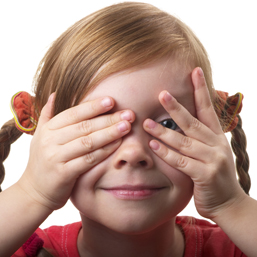
The first thing to recognize is these behaviors are a normal part of a child’s development. The approach you take should depend on the age of your child. Sometimes children cheat at games because they do not always remember the rules, or they are deeply focused on getting something right that the rules slip into the background of their thoughts.
For young children, it may be best not to use the word ‘cheat.’ Instead, remind them of how the game is played. Younger children may feel outranked when playing with you or their older siblings, especially if their siblings are competitive. Although some might disagree with me, I believe it is okay to let very young children win. Let them hear you say, “I am happy for you that you won. That feels good. It’s okay for me to lose, because just playing the game is fun.” Doing well is fundamental to the motivation to keep learning.
Once your child knows how to play the game, gradually allow yourself to win. Model the same behaviors. Comment on some good moves your child made. If it is a game of luck, say, “It depends on the cards we get or how the dice rolls. We don’t have control of that. I didn’t get very good cards this time, but maybe I will next time. That’s how the game is played, and it doesn’t matter who wins. What matters is, we love each other and like doing things together.” As your child gets older and more competent in their game skills, play the game normally. In the meantime, you are modelling good sportsmanship and handling losing appropriately when someone else wins.
Once your child is nine or 10, the approach should be different. By this age, they know the rules - they also know they are breaking the rules. Point out that games have rules to make playing fair for everyone. For example, in sports, if you break a rule, you get a penalty. If you break a traffic rule, you get a ticket - or worse, you may hurt someone else or yourself.
You might want to make a rule for family games: if someone cheats, they miss their next turn. If the behavior persists, then the rule becomes: if you cheat, you are out of that game.
Modelling is the best way for children to learn how to handle their emotions. Children with low self-esteem have a harder time with this. If you raise your children knowing that you love them simply for who they are, they won’t have such a hard time with losing. It is important for your children to understand that their self-worth is not tied to their performance. If you criticize a child for not doing well on the field or on a school assignment, your child may beat themselves up if something does not go well.
For older children, it is important to differentiate between a sore loser and deep emotion after a loss. Even in professional sports, we see strong emotion for the losing team after the Stanley Cup or Grey Cup. Olympic athletes can suffer deep pain when they did not win that medal their heart was set on.
A sore loser is different. A sore loser blames others for the loss or cannot handle the fact that their opponent performed better. A sore loser likely was not taught strategies to deal with disappointment, so may demean the winners or hold a grudge.
View sore loser behavior as a teaching opportunity. Explain to your child that disappointment is okay. But acting out negatively in a way that impacts the mood of everyone else is not okay. If the episode happens at home, have your child take some time to cool down and get their emotions out. It is important to let your child know that you understand their feelings and they are not a bad person because of those feelings. The heat of the moment is not a good time to talk about it and will only escalate the behavior.
Remember, cheating and sore losers are signs of low self-esteem. See these as red flags, and vow to support, rather than blame, your child.
Gwen Randall-Young is an author and award-winning psychologist. For permission to reprint this article, or to obtain books, CDs, or MP3s, visit gwen.ca. For daily inspiration, follow Gwen on Facebook.
Calgary’s Child Magazine © 2024 Calgary’s Child